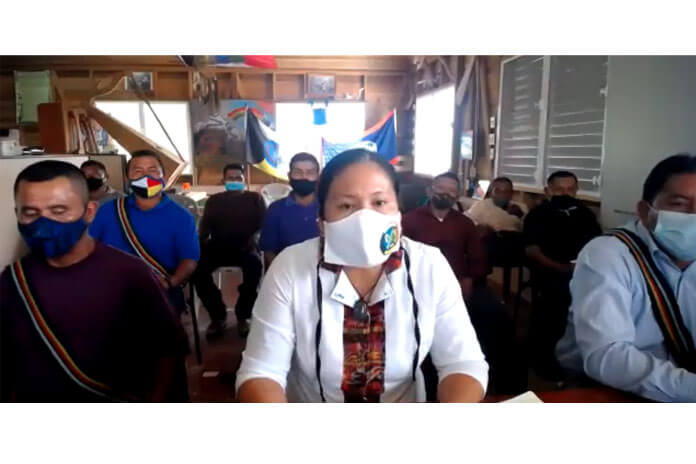BELIZE CITY, Fri. June 18, 2021– During a press conference this past week, the spokesperson of the Toledo Alcaldes Association (TAA) and the Maya Leaders Alliance (MLA), Cristina Coc, commented on the difficulties facing the Maya community in the implementation of the Free, Prior, Informed Consent (FPIC) Protocol — which is a set of guidelines for the acquisition of customary lands.
Coc shared that both the current government (PUP) and the previous administration (UDP) have dragged their feet in the execution of a Consent Order that requires demarcation of lands for the Maya people and have had issues with the fact that the decision-making process will take place within the Maya villages, represented by their Alcaldes.
During a press conference on Thursday, Coc stated that, prior to the 2020 change of government, the process was in its final stages and was to have been reviewed by the UDP’s Cabinet.
“Both the past administration and this new administration seem to think that an FPIC Protocol should not include the traditional governance system of the Maya communities. Of course, that is contrary to self-determination and the process by which indigenous communities are afforded the rights to determine their own representations, and so the FPIC Protocol seems to us, from our side, that the government is unwilling or reluctant to adopt the FPIC Protocol,” Coc stated.
The Maya people of Southern Belize scored yet another huge win this past week with the judgment in favor of Jalacte village, which, together with two residents of the village, is to receive over $6 million in compensation from the Government of Belize for the use of their lands for road-construction and the placement of a BAHA outpost. A major issue coming out of that case was the issue of consent — which, despite extensive legal objections by the previous government, has been recognized by the courts and the United Nations Declaration on the Rights of Indigenous Peoples as a necessary prerequisite for any use of customary lands.
The Free, Prior, and Informed Consent Protocol will allow the Mayan people to give or withhold consent for any form of acquisition or use of their customary lands. The government of Belize and representatives from the indigenous community have been in discussion to implement the set of guidelines for, as previously mentioned, 6 years now.
The government is now contending that there are other groups claiming to represent Maya communities and their interests who are asking to be at the table and be a part of the implementation of the FPIC.
In reference to those claims, Coc said, “The Government of Belize is telling us that there are other groups that have emerged, who want to be able to provide their input, and are objecting to the FPIC protocol, again raising the issue of representation. The court was very clear today. It is not for the Government of Belize to determine who and how the Maya people will be represented.”
The MLA and TAA have been at the forefront of the fight for indigenous Maya land rights for years, achieving major precedent-setting victories in the high courts. Coc pointed out that giving a voice and role to these new groups that have emerged is an attempt to obstruct the process, and she noted that, while CCJ Justice Jacob Wit had mentioned that “inputs from other groups, from the Maya, should be welcome,” he also outlined clearly who the appellants and, in turn, representatives of the Maya, are.
“The court was very clear today; we are very clear who the appellants are, we are very clear who has been leading this struggle for a long, long time. Consistently, it has been our traditional alcaldes. Consistently, we have gone to the courts on behalf of our communities and we have championed these various victories at the courts, and so now, in the words of one of our elders, when the caldo done fix, everybody wahn come and share di bowl.” Coc remarked.
She commented that the emergence of the new groups vying to represent the Mayan people arbitrarily is a case of déjà vu for them, and recalled that at the beginning of their legal efforts this was also the case.
“We went through six years with the previous Commissioner constantly undermining the customary leadership of the Maya people, and now we see that the dawn of the establishment of a new commission, the emergence of these random groups that are telling us that they ought to have an equal vote at the negotiating table, equal to that of the Maya people’s governance system. What we see this amounting to is a continued disrespect of the Maya people’s chosen representatives.” Coc said.
Today, the Sarstoon Temash Institute For Indigenous Management (SATIIM), along with the Toledo Maya Cultural Council (TMCC) and the Kekchi Council of Belize, issued a joint press release urging the Maya Leaders Alliance and the Julian Cho Society (JCS) and its advisors on the Land Tenure Facility to, “welcome input from other Maya groups”.
In reference to the implementation of the FPIC, SATIIM’s release states, “Given SATIIM has already developed participatory methods for community mapping and boundary agreements, we now anticipate joining the Steering Committee to share our experience and knowledge.”
Leader of the Kekchi Council of Belize, Pedro Kukul, in the release called on the Maya community to “set a good example of how to implement Free, Prior and Informed Consent — starting with including all of our input on the FPIC draft document.”
The release goes on to allege that the Julian Cho Society has received millions of dollars from the Land Tenure Facility to carry out a community consultation. “However, its insistence to only consult with a representative of the Toledo Alcalde Association has resulted in conflict and division among Maya communities in a process that should instead unite them,” the release said.

